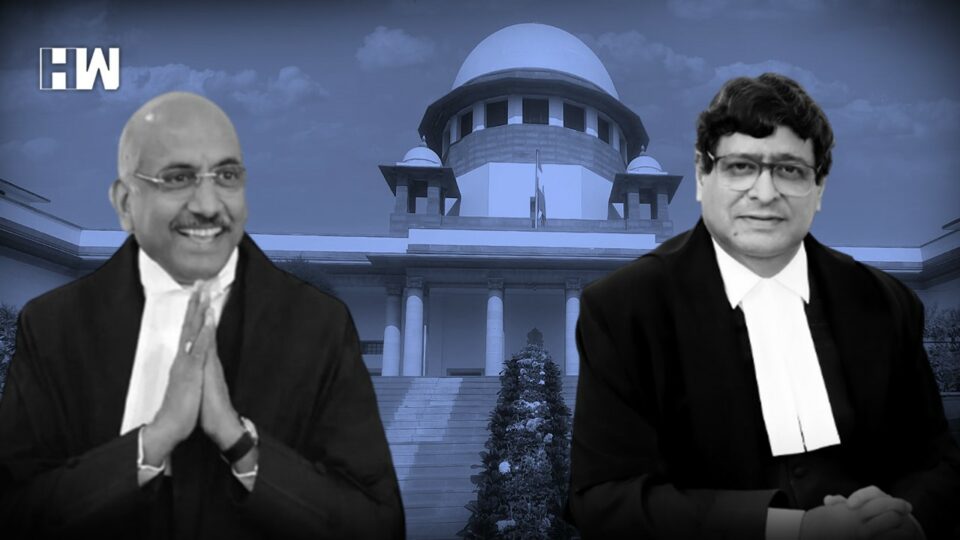Whether it is necessary to establish that hijab is an essential religious practice to seek the protection of Article 25(Freedom of conscience and free profession, practice and propagation of religion)?
The Supreme Court Thursday announced a split verdict in the Karnataka hijab ban case. In view of the “divergence in opinion”, the top court directed the matter to be placed before the Chief Justice of India for appropriate directions.
While Justice Hemant Gupta upheld the Karnataka High court decision and dismissed the appeals challenging the Karnataka High Court order, Justice Sudhanshu Dhulia allowed them.
What were the differences?
“There is a divergence of opinion. In my order, I have framed 11 questions. First is, whether appeal should be referred to Constitution bench. Whether college management can take a call on uniform of students and if wearing of Hijab and restricting it is violative of Article 25. Whether right under Article 19 and Article 25 is mutually exclusive. Whether government order infringes upon the fundamental right. Can student exert her fundamental right, is wearing right a part of essential religious practice under Islam, whether government order serves purpose of access of education: the answer according to me is against the appellant”. Justice Hemant Gupta said.
Also Read:Mohali: Key Accused In RPG Attack Arrested From Mumbai
Differing from Justice Gupta, Justice Dhulia said “I have set aside the Karnataka High Court order and quashed the government order. Venturing into essential religious practice was not needed and the court took a wrong way. It was just a question of choice. One thing which was topmost for me was education of girl child.”
Concluding the verdict, Justice Hemant Gupta said “In view of divergent opinions, let the matter be placed before the Chief Justice of India for appropriate directions.”
The bench had reserved the judgment on September 22 after hearing arguments for ten days.
Senior Advocates Dr.Rajeev Dhavan, Kapil Sibal, Dushyant Dave, Huzefa Ahmadi, Sanjay Hegde, Salman Khurshid, Devadatt Kamat, Yusuf Mucchala, AM Dhar, Adithya Sondhi, Jayna Kothari, Colin Gonsalves, Advocates Prashant Bhushan, Nizam Pasha etc, made arguments for the petitioners.
Solicitor General of India Tushar Mehta and Attorney General of Karnataka Prabhuling Navadgi appeared for the State defending the High Court verdict. Senior Advocates R Venkataramani, Dama Seshadri Naidu, V Mohana made arguments for College Development Committees/Teachers in support of the hijab ban.
Highlights of questions that arose during the judgment:
- Whether the matter has to be referred to a larger bench in view of the pendency of the Sabarimala reference?
2. Whether hijab is an essential religious practice in Islam?
3. Whether it is necessary to establish that hijab is an essential religious practice to seek the protection of Article 25(Freedom of conscience and free profession, practice and propagation of religion)?
4. Whether the February 5 Government Order can be justified on the grounds of reasonable restrictions under Article 19(2)?
5. Whether the wearing of hijab can be prohibited on the ground that certain other groups started protesting by wearing saffron shawls? Whether such a restriction amount to succumbing to hecklers veto?
6. Whether there is any legitimate state interest in imposing a restriction which will lead to the deprivation of education for Muslim girls, who are already facing social backwardness?
7. Whether the wearing of a headscarf of the same color of the prescribed uniform dress can be allowed on the principle of reasonable accommodation?
8. Whether there is any fundamental right to wear a religious dress in a classroom where a uniform has been prescribed for all students?
9. Whether prescription of a uniform in an educational institution can be held to an unreasonable restriction?
During the arguments, the State informed the SC that there was no established practice of wearing hijab by Muslim girls students and that the protests were set up by the Campus Front of India and the Popular Front of India(Banned by the Indian government).
As an independent media platform, we do not take advertisements from governments and corporate houses. It is you, our readers, who have supported us on our journey to do honest and unbiased journalism. Please contribute, so that we can continue to do the same in future.

